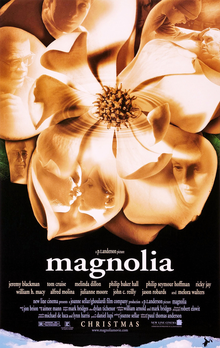An American Western filtered through Gallic sensibilities, The Sisters Brothers was a box-office flop, but it remains one of the more intriguing movies of recent years. To its credit, it gives John C. Reilly another chance to show what a remarkable actor he is when he's given more than just a backup role to play; he somehow sends even such charismatic performers as Joaquin Phoenix, Jake Gyllenhaal, and Riz Ahmed into the background when he's on screen. Full of quirky dialogue and unexpected situations, the movie's chief flaws are that it feels a little longer than necessary and the narrative is occasionally more elliptical than necessary.
A blog formerly known as Bookishness / By Charles Matthews
"Dazzled by so many and such marvelous inventions, the people of Macondo ... became indignant over the living images that the prosperous merchant Bruno Crespi projected in the theater with the lion-head ticket windows, for a character who had died and was buried in one film and for whose misfortune tears had been shed would reappear alive and transformed into an Arab in the next one. The audience, who had paid two cents apiece to share the difficulties of the actors, would not tolerate that outlandish fraud and they broke up the seats. The mayor, at the urging of Bruno Crespi, explained in a proclamation that the cinema was a machine of illusions that did not merit the emotional outbursts of the audience. With that discouraging explanation many ... decided not to return to the movies, considering that they already had too many troubles of their own to weep over the acted-out misfortunes of imaginary beings."--Gabriel García Márquez, One Hundred Years of Solitude
Search This Blog
Showing posts with label John C. Reilly. Show all posts
Showing posts with label John C. Reilly. Show all posts
Tuesday, February 18, 2025
The Sisters Brothers (Jacques Audiard, 2018)
Cast: John C. Reilly, Joaquin Phoenix, Jake Gyllenhaal, Riz Ahmed, Rebecca Root, Allison Tolman, Rutger Hauer, Carol Kane. Screenplay: Jacques Audiard, Thomas Bidegain, based on a novel by Patrick DeWitt. Cinematography: Benoît Debie. Production design: Michel Barthélémy. Film editing: Juliette Welfling. Music: Alexandre Desplat.
Wednesday, September 11, 2019
Boogie Nights (Paul Thomas Anderson, 1997)
Cast: Mark Wahlberg, Burt Reynolds, Julianne Moore, John C. Reilly, William H. Macy, Heather Graham, Don Cheadle, Philip Seymour Hoffman, Luis Guzmán, Joanna Gleason, Ricky Jay, Philip Baker Hall, Alfred Molina, Thomas Jane, Michael Penn. Screenplay: Paul Thomas Anderson. Cinematography: Robert Elswit. Production design: Bob Ziembicki. Film editing: Dylan Tichenor. Music: Michael Penn.
Paul Thomas Anderson's breakthrough film is a reworking at feature length of a short film he made in 1988, and it has the earmarks of what was to come from him as writer-director: complex narratives with large casts, featuring some of the same actors from film to film. It also launched Mark Wahlberg out of his career as a rapper and underwear model into success as a film actor and producer. Wahlberg plays a naïve layabout who gets into the porn business under the screen name Dirk Diggler. He is mentored by the filmmaker Jack Horner (Burt Reynolds) and by the actress Amber Waves (Julianne Moore), who acts as a kind of den mother for the various porn stars under Horner's aegis. The camaraderie of this little company is tested by the passage of time, as the feel-good 1970s turn into the anxious 1980s.
Friday, December 16, 2016
The Lobster (Yorgos Lanthimos, 2015)
Friday, December 18, 2015
Magnolia (Paul Thomas Anderson, 1999)
I remembered only two things about Magnolia from the first time I saw it: the rain of frogs and Tom Cruise's performance. Now it occurs to me that perhaps I should watch some of Anderson's other films again, especially There Will Be Blood (2007), about which I remember mainly the "milkshake" scene, because there is so much more good stuff going on in Magnolia than I remembered. It has that loose, semi-improvised quality that I have come to admire in Godard, while still lavishing all the resources that the backing of New Line Cinema could afford. On the other hand, I think that the abundance of resources may have undermined the film, because it made possible the two things I did remember, the special-effects frogs and the A-list presence of Cruise, at the expense of the detail work that comes to the fore in my rewatching. I'm talking especially about Philip Seymour Hoffman's touching performance as Jason Robards's nurse, John C. Reilly's naive cop, Melora Walters's scattered druggie, Philip Baker Hall's disintegrating game show host, and Julianne Moore's descent into hysteria. That said, I still appreciate both the frogs and Cruise, who lets out the madness that we had only glimpsed before in his work. The performance earned him an Oscar nomination, as over-the-top and supposedly out-of-character performances tend to do. (We would later, in the Katie Hughes era and as his commitment to Scientology came to the fore, come to wonder how out of character this manic Cruise really was.) I think the movie is too long (it runs 188 minutes), and that perhaps some of its segments exist only because of Anderson's commitment to the actors who made Boogie Nights (1997). I'm thinking here of William H. Macy's character, which seems to me like a dangling thread in the fabric of the film -- though it does result in a wonderful scene in which Macy and Henry Gibson compete for the attention of a hunky bartender (Craig Kvinsland). As for the frogs, I refuse to speculate on their "meaning," preferring the reaction of Stanley (Jeremy Blackman): "This happens. This is something that happens."
Subscribe to:
Comments (Atom)








